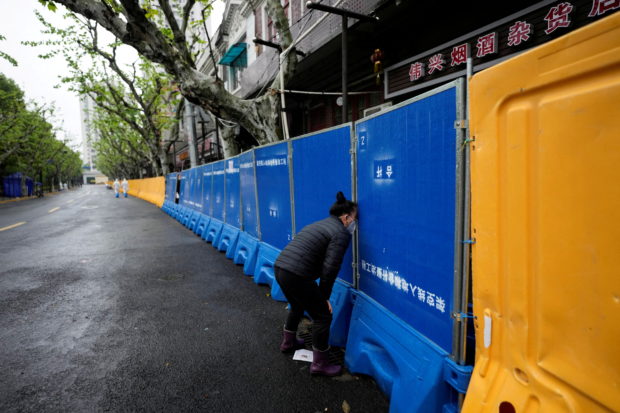‘How did we catch it?’: spread of COVID baffles locked-down Shanghai residents

A woman tries to buy food from a vendor behind barricades of a sealed-off area, during lockdown amid the coronavirus disease (COVID-19) pandemic, in Shanghai, China April 14, 2022. (REUTERS/File Photo)
SHANGHAI – Veronica thought she did everything right by sticking to all of the COVID-19 lockdown rules in the Chinese city of Shanghai.
After the entire city was shut down on April 1, her family of four scrupulously followed government orders to stay at home, stepping out the front door only for mandatory PCR testing.
When curbs were relaxed slightly in mid-April, letting residents walk about within their compounds, Veronica and her neighbours all wore masks.
For weeks, their housing estate was free of COVID.
But in late April, after what Veronica thinks was her 12th PCR test, she, another member of her family, and a handful of neighbours tested positive.
Article continues after this advertisement“I have no idea how we caught it,” said Veronica, who declined to give her full name, citing privacy.
Article continues after this advertisementHer building was declared “sealed”. She, her family and the others who tested positive were sent into quarantine. Everyone else was ordered back indoors for another 14 days.
“I followed all the rules,” Veronica said from a quarantine centre where she and her family are confined with hundreds of people in a vast hall.
Veronica is among thousands who have caught COVID in compounds that had been free of the coronavirus and sealed off for weeks.
The cases underscore how difficult it is to stop the spread of the highly transmissible Omicron variant as China clings to its zero-COVID policy, perpetuating a cycle of lockdowns, as well as bafflement, anguish and anger.
Between April 21 and May 2, residents at 4,836 different addresses found themselves in a similar situation, with infections cropping up after weeks in the clear, according to a Reuters examination of Shanghai government data.
On April 30 alone, 471 addresses were recorded as having found at least one case, after registering none at all in the previous 29 days. The number of residents at a given address varied from a handful to hundreds.
Shanghai’s lockdown measures have been extremely strict, especially during the first two weeks of April, with residents allowed out of compounds only for exceptional reasons, such as a medical emergency. Many are not even allowed out of their front doors to mingle with neighbours.
Shanghai’s daily case numbers have come down for six straight days but the thousands of new ones still being found every day drive speculation about how COVID is spreading, debate over the wisdom of the “zero-COVID” policy and fear of infection.
WORKING, TO A POINT
Searching for answers, many residents point to queuing for the all-to frequent PCR tests, or deliveries of food and other items, which all rely on volunteers, property management staff and couriers.
Some people have even begun to refuse PCR tests, bringing penalties for failure to comply.
The Shanghai government, asked for comment, referred to remarks on April 14 by city health official Wu Huanyu, who said that infection through the distribution of supplies could not be ruled out, among other possibilities.
Health experts say the relentless spread points to China’s difficulty in sticking to its zero-COVID goal.
“Their zero COVID policy works to a point but then they will keep getting hit hard, especially when they haven’t used that time to get high coverage of their most vulnerable population,” said Paul Hunter, professor of medicine at the University of East Anglia, referring to China’s relatively low rates of vaccination compared with other places.
Jaya Dantas, a public health expert at the Curtin School of Population Health in Australia, said China’s approach had come with high costs, and to stamp out transmission completely would take months.
“They have been effective but really harsh with constant testing which is resource, labour and financially intensive. The mental health impacts on the population are also significant,” she said.
Lockdowns in Shanghai and dozens of other cities have triggered rare public shows of discontent, especially as the persistent emergence of a relatively few infections prolongs the confinement of millions of others.
Each new case has multiple consequences: the COVID positive person and their close contacts must go into quarantine. All neighbours in their building must isolate for 14 days, with the clock resetting every time a new case is found.
Veronica says she has been scarred by the experience.
“Don’t leave your apartment, but I don’t even know if that helps anymore,” she said.
gsg
For more news about the novel coronavirus click here.
What you need to know about Coronavirus.
For more information on COVID-19, call the DOH Hotline: (02) 86517800 local 1149/1150.
The Inquirer Foundation supports our healthcare frontliners and is still accepting cash donations to be deposited at Banco de Oro (BDO) current account #007960018860 or donate through PayMaya using this link.